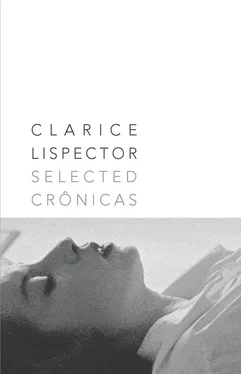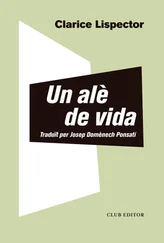Poisoned flowers in a vase. Red, blue, pink, they carpet the air. How they transform a hospital ward. I have never seen such beautiful and dangerous flowers. So this is your secret. Your secret resembles you so closely that it tells me nothing beyond what I already know. And I know so little, as if I were your enigma. Just as you are mine.
— Tomorrow I shall be ten years old. I intend to make the most of this last day of my ninth year.
There is a pause. Sadness.
— Mummy, my soul is not yet ten years old.
— How old then?
— I guess about eight years old.
— Don’t worry, that’s how it should be.
— But I think we should count our years by our soul. People would then say: that chap died at twenty. And the chap had died, but with a seventy-year-old body.
Later he began to sing, then stopped and said:
— I am singing Happy Birthday to myself. But, Mummy, I haven’t really made much of my ten years.
— Yes, you have.
— No, no, I don’t mean much in the sense of doing this and that. What I mean is that I have not really been very happy. What’s wrong? Why are you looking so sad?
— I’m not sad. Come here and let me give you a kiss.
— Didn’t I tell you? Didn’t I say you’re looking sad? You can’t stop kissing me and when you give somebody all those kisses it’s because you’re feeling sad.
He is the brightest boy in his class. He never plays games. (His secret is a snail.) His hair is cropped, his eyes are gentle and attentive. His delicate skin at nine years of age is still transparent. He is polite by nature. He handles things without breaking them, lends books to his school-mates, helps them with their lessons, does not lose his patience with the square and the rule, and never misbehaves, like all the other unruly boys.
His secret is a snail. Which he does not forget for a single moment. His secret is a snail, which he treats with dispassionate and agonizing care. He keeps it safely in a shoe-box. With solicitude he pierces the box every day with a needle and string. With the utmost care he postpones its death. His secret is a snail, nurtured with insomnia and precision.
— Today at school I wrote an essay about Flag Day which was so beautiful, but ever so beautiful — for I even used words without really knowing what they meant.
That spring was really dry, the radio crackled, picking up atmospheric interference; my clothing bristled as it released the body’s electricity, and my comb lifted magnetized hairs; it was an ominous spring. And so very empty. From wherever one happened to be, the impression was the same: the journey ahead seemed long, the road endless. There was little conversation: the body was as heavy as its sleep; eyes were big and expressionless. On the terrace, the goldfish gyrated in its tank; we sipped our drinks looking at the countryside. The wind carried the daydreams of goats from the fields. By the other table on the terrace, a solitary faun. Charged with static, we stared dreamily into the glasses in our hands. ‘What were you saying?’ ‘I didn’t say a thing.’ The days went by. But one moment of harmony was enough to capture once more that barbed static of spring: the rash dreams of goats, the hollow fish, a sudden urge to steal apples, the crowned faun taking solitary leaps. ‘What?’ ‘Nothing. I didn’t say anything.
But I could hear the stirring of a murmur, like a heart beating underneath the earth. Quietly, I put my ear to the ground and could hear summer breaking through, and my heart beating underneath the earth — nothing, I said nothing — and I could sense the persistent violence with which the closed earth was opening up inside as it prepared to give birth, and knew with what burden of sweetness the summer would ripen a hundred thousand oranges, and I knew that those oranges were mine, simply because I wanted it so.
It took me some time to make out what I was seeing, it was so unexpected and subtle. I was seeing a pale green insect with long legs, which was resting. It was a grasshopper, which people were always assuring me is an omen of good fortune. Then the grasshopper began to move very gently across the counterpane. It was a transparent green, with legs supporting its body on a higher and freer plane, a plane as fragile as the grasshopper’s own legs, which seemed to consist only of the colour of their outer shell. There was nothing inside those threadlike legs: the inside layer was so thin that it was indistinguishable from the outer layer. The grasshopper looked like a transparency which had come off the paper and was crawling about in green. But however somnambulant, it moved with determination. Somnambulant: the tiniest leaf of a tree which had achieved the solitary independence of those who pursue the blurred traces of a destiny. And it crawled with the determination of someone tracing a line which was simply invisible to the naked eye. It crawled without a tremor. Its inner mechanism was not tremulous, but it had the regular oscillation of the most delicate clock. What could love be like between two grasshoppers? Green and green, and then the same green, which, suddenly, because of a vibration of greens, turns green. Love predestined by its own semi-aerial mechanism. But where were the glands of its destiny and the adrenalines of its parched, green entrails? For it was a hollow creature, a splintered grafting, a simple attraction of green lines. Like me? Me. Us? Us. In that slender grasshopper with its tall legs, which are capable of crawling over a woman’s bosom without arousing the rest of her body; in that grasshopper which cannot be hollow because a hollow line does not exist; in that grasshopper, atomic energy is conducted in silence without any drama. Us? Us.
I can recall that spring. I know I ate the pear and threw away half of it. I never feel compassion in the spring. Later we drank water at the fountain and I did not dry my lips. We walked defiantly in silence. As for the swimming-pool, I know that I stayed in the pool for hours. Look at the pool! That was how I saw the pool, contemplating it with tranquil eyes. Calmly taking without compassion what was mine.
From time to time I receive letters asking me if I am Russian or Brazilian and people invent all sorts of myths about me.
Let me clarify this matter once and for all: I am sorry to have to tell you that there are no mysteries and these myths are untrue. My story is as follows: I was born in the Ukraine, the homeland of my parents. I was born in a village called Tchechelnik, which is too small and insignificant to appear on any map. When my mother was expecting me, my parents were already planning to emigrate either to the United States or to Brazil. They waited on in Tchechelnik until I was born and then set out on their long journey. I was two months old when I arrived in Brazil.
I am a naturalized Brazilian and, had my parents set out a few months earlier, I should have been born in Brazil. It was the Portuguese language which influenced my spiritual life and innermost thoughts, and this was the language I used to utter words of love. I began to write short stories as soon as I could read and write and, needless to say, I wrote them in Portuguese. I spent my childhood in Recife and I firmly believe that living in the Northern or North-eastern provinces of Brazil brings one into closer contact with Brazilian life at its most authentic, because there the country is remote from outside influences. My beliefs were nurtured in Pernambuco, the food I enjoy most is from Pernambuco. And from our housemaids I absorbed the rich folklore of those regions. I was already in my teens when we moved to Rio, this vast metropolis I soon began to think of as Brazilian carioca .
Читать дальше












